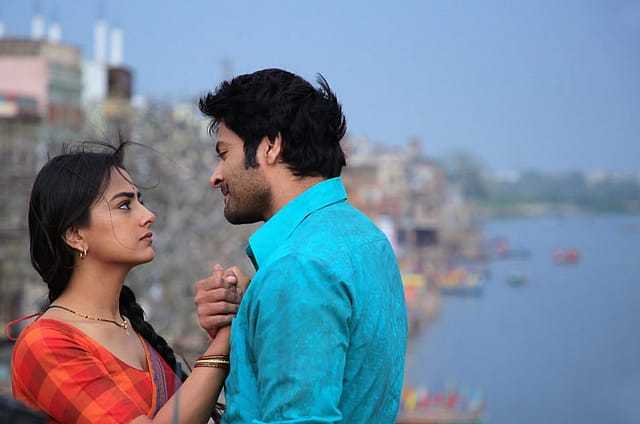Milan Talkies Movie Review

This is a film about the relationship between life experiences and the making of movies. Set in Allahabad, it is clearly a very personal film by director Tigmanshu Dhulia. He was born and raised in the city. His father was an Allahabad High Court Judge and his mother a Professor of Sanskrit. Erudition in small town India is reflected in the broad minded and literate approach to a wide range of issues, depicted in this and other films made by him.
In 'Milan Talkies' Dhulia gets up close and personal, directly addressing social and cultural experiences within his city. He tells a love story from two perspectives. One is from the watching of movies, and the other from the observation of divisions in a rigid and class structured society.
Annu (Ali Fazal) obsessively watches Hindi movies at Milan Talkies, a vintage single screen theatre. He knows the lobby, the seats and the projection room like the back of his hand. The projectionist is his soul buddy, a middle aged man called Usman (Sanjay Mishra). Whenever there is a power outage, and the audience is yelling for their money back, Annu and his friends keep things quiet, entertaining the good folks with live recitations from classic Hindi movies.
Naturally, Annu is a director of sorts himself, and has a posse of actors, and would be actors, at his command in Allahabad. He makes locally set films about cheats and gangsters and lovers. Since he is a multi-tasking professional, he makes additional money from the copying and sharing of examination papers. In this connection, he meets and falls in love with a very pretty would-be-graduate called Maithili (Shraddha Srinath). She is the daughter of a conservative 'Pujari', and so it is perhaps a prophecy foretold that Maithili – which is one of the names of the Goddess Sita – will have to go through a trial by fire to prove her purity.
AIming High
20 Feb 2026 - Vol 04 | Issue 59
India joins the Artificial Intelligence revolution with gusto
The parallel tracks of cinema, religion and social conflict are now set up at the movie theatre, and the distillation of all these multi-faceted experiences begins. As Annu and Maithili enter their star-crossed lover phase, Maithili returns to the projection room, where their love first blossomed. Years have passed. In the intervening period, Annu has become a director in Mumbai, and his film has released in Allahabad. With the grace and kindness of Usman Bhai, she watches Annu's film over and over again, both from the projection room and the theatre. This obsessive quality of love, and the lover's inability to delete it from memory, is made to seem uncannily parallel to film, and the film buff's compulsive replaying of scenes in the mind. Giuseppe Tornatore's 'Cinema Paradiso' must certainly have been one of the reference points for the conceptualisation of this idea in the movie.
Ali Fazal plays Annu with energy, but without the kind of intense passion necessary for the role. The actor who holds you to the movie from the moment you see her is Shraddha Srinath. As the threads of experience, memory and the medium of cinema start coming together, 'Milan Talkies' makes sense, but it takes a while, and the nuanced character of Maithili is the glue. The intelligence and expressiveness displayed by this actress goes a long way in making this a watchable movie.
